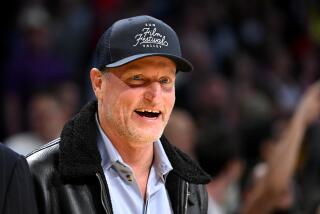Brown Denies Advising Tobacco Industry : State politics: The Speaker says he did not give suggestions on legislative strategy to preempt local smoking rules. A memo quotes lobbyist as saying he did.
- Share via
SACRAMENTO — Saying it would have been “stupid,” Assembly Speaker Willie Brown (D-San Francisco) on Tuesday denied implications in a tobacco industry memo that he helped coach cigarette executives on legislative strategy to preempt local smoking restrictions.
But Brown, who has collected large campaign contributions from tobacco interests, said he supports the kind of statewide legislation that was outlined in the leaked memo and introduced last month over the objections of anti-smoking activists.
“I believe there is room in this society for tobacco products. . . . I think that you ought not to do it (smoking), but you shouldn’t be committing a crime when you’re doing it,” said Brown.
Brown’s remarks were in response to a six-page memo, released Monday by three health organizations, that purportedly details a June 28 telephone conference call between cigarette companies, tobacco industry officials and their Sacramento lobbyists. The subject, according to the memo, was how to fashion legislation with the “appearance” of controlling tobacco use that in fact is intended to stop counties and cities from enacting tough anti-smoking ordinances.
Anti-smoking advocates--among them the California chapters of the American Cancer Society, the American Heart Assn. and the American Lung Assn.--say such a measure was introduced over their objections two weeks later by Assemblyman Gerald N. Felando (R-San Pedro). A legislative showdown on the bill has been rescheduled for Thursday before the Assembly Ways and Means Committee.
In the memo, written by the president of the Washington-based Smokeless Tobacco Council, a lobbyist for Philip Morris said the idea of drafting the legislation evolved from suggestions made by Brown when he visited cigarette executives in New York City last fall. Philip Morris paid more than $3,000 for that mid-November trip, records show.
“The Speaker believes the trick to doing this would be that such an act would have to have the ‘appearance’ of a comprehensive scheme,” the memo says.
On Tuesday, Brown flatly denied making those remarks. “I don’t give advice of that nature. That’s stupid,” he said, adding that the leaked memo may have been planted to kill measures like the Felando bill.
He suggested that the memo misquoted his long-standing position in support of a “uniform” statewide tobacco control law that would license tobacco retailers in much the same way the state regulates establishments selling alcohol--the central concept in the Felando bill. Such state preemption of local smoking restrictions would give smokers guidance as to where and when they could light up as they moved around the state.
Anti-smoking advocates, however, say such a scheme would be virtually impossible to enforce and they contend that the Felando bill is riddled with loopholes.
The Tobacco Institute says that of the 229 local governments that restrict smoking, only 16 have regulations stricter than those proposed in the Felando bill.
Brown also stressed that tobacco industry campaign contributions have not compromised his views. The Speaker has collected $105,000 from tobacco giants Philip Morris and R.J. Reynolds during the first half of 1991, public records show. A recent UC San Francisco study said he collected another $154,750 from the industry between 1986 and 1990 --the most given to any legislator.
Philip Morris also paid for Brown to attend the 1990 Kentucky Derby, records show. The Speaker at one time also represented an American subsidiary of BAT Industries, an international conglomerate that owns tobacco companies, as one of his private law clients.
None of the 10 tobacco industry officials mentioned in the memo could be reached or would return repeated telephone calls Tuesday.
More to Read
Get the L.A. Times Politics newsletter
Deeply reported insights into legislation, politics and policy from Sacramento, Washington and beyond. In your inbox three times per week.
You may occasionally receive promotional content from the Los Angeles Times.










